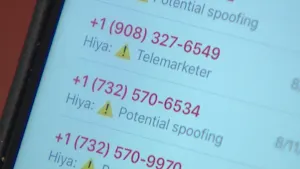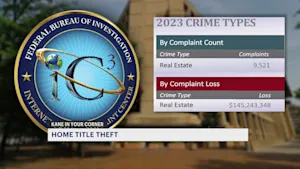Law professor breaks down process of certifying electoral votes
A showdown is looming in Washington as Congress meets Wednesday to certify the electoral votes for the presidency.
•
Jan 6, 2021, 1:56 AM
•
Updated 1,394 days ago
Share:
More Stories
2:08

Man overbilled by thousands of dollars; Kane in Your Corner steps in to fight credit card company
3ds ago2:01

Kane In Your Corner: Protecting yourself against voter registration scams
17ds ago2:03

KIYC: What to do if you lose access to your social media account
31ds ago1:50

Kane In Your Corner: What you can do to stop spam calls and texts
59ds ago2:07

Kane In Your Corner: How homeowners can prevent real estate fraud
73ds ago1:36

KIYC: Insurance expert explains what to do when filing storm damage claims
83ds ago2:08

Man overbilled by thousands of dollars; Kane in Your Corner steps in to fight credit card company
3ds ago2:01

Kane In Your Corner: Protecting yourself against voter registration scams
17ds ago2:03

KIYC: What to do if you lose access to your social media account
31ds ago1:50

Kane In Your Corner: What you can do to stop spam calls and texts
59ds ago2:07

Kane In Your Corner: How homeowners can prevent real estate fraud
73ds ago1:36

KIYC: Insurance expert explains what to do when filing storm damage claims
83ds agoA showdown is looming in Washington as Congress meets Wednesday to certify the electoral votes for the presidency.
A showdown is looming on Capitol Hill Wednesday, as Congress meets to officially count the electoral votes in the presidential election. It's normally a ceremonial process. But this year, more than 100 Republican House members and approximately a dozen GOP senators are promising to challenge the vote count in several states because of claims of voting irregularities.
So how exactly would a challenge unfold? And is there a chance it could be successful? To answer those questions, Kane In Your Corner spoke with Eugene Mazo, a law professor who specializes in election law.
Mazo says the Republican challenge will likely be symbolic at best because the GOP simply does not have enough votes to succeed. "In the House, Democrats have a slim majority and they're not going to vote to overturn any of these votes," he says. "And I don't think the Senate is either because there are 48 Democrats in the Senate and we've already had at least 10 Republican members say this is this is not going anywhere. This is what they call sound and fury, but there's nothing to it."
The electoral count will begin at 1pm with a joint session of congress. Under procedures established by the Electoral Count Act of 1887, Vice President Mike Pence will open envelopes from each state, announce the electoral votes and ask if there are any objections. In most years, the process takes no more that 20 minutes. But this year, Republicans are expected to object to the electoral count in up to six states: Arizona, Georgia, Michigan, Nevada, Pennsylvania and Wisconsin. That could make things take considerably longer.
"There has to be an objection both from a member of the House and a member of the Senate," Mazo says. "At that point, the joint session takes a halt, the members of the Senate retreat to their chamber, the members of the House remain in their chamber, and a debate happens."
Debate is capped at two hours per state. Then, each house votes on the objection. If both the House and Senate sustain the objection, the disputed electoral votes from that state are tossed. If either house votes to uphold the vote, the vote is counted. Since each state challenge can spark a two-hour debate, how long the debate lasts depends on how many states are challenged. Lawmakers could even opt to challenge all 50 states, but Mazo warns that might not be advisable since, "According to one reading of the law, the House and Senate have to remain in their chambers until they decide."
In the end, Mazo says the outcome of this year's election is not seriously in doubt. He says President-elect Joe Biden will be inaugurated in two weeks. But he worries about the potential long-term effects on an already polarized nation.
"The precedent that's being set here, where one party doesn't believe that the election was fair and can try to overturn it is something that we haven't seen in our country, and it's extremely dangerous," he says.
More from News 12
1:37

Rockland Republicans Get Out The Vote rally features national political figure
1:33

Flu, COVID vaccines being offered to early voters at the Greenburgh Town Hall
0:35

Walden smoke shop closed for allegedly selling illicit cannabis
1:44

Alleged violent hazing incident at NFA cancels homecoming football game, postpones related activities
1:35

ICE spokesperson: Accused Somers shooter is illegal immigrant from Chile
3:15
